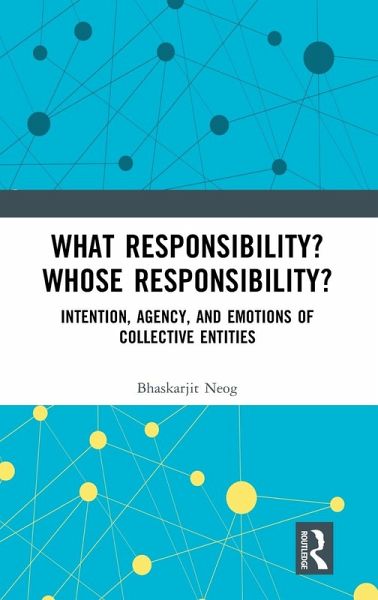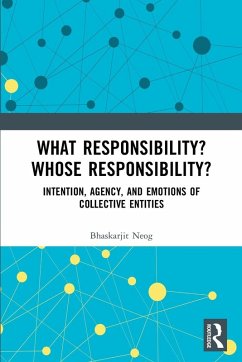
What Responsibility? Whose Responsibility?
Intention, Agency, and Emotions of Collective Entities
Versandkostenfrei!
Versandfertig in 6-10 Tagen
154,99 €
inkl. MwSt.
Weitere Ausgaben:

PAYBACK Punkte
77 °P sammeln!
This book is an enquiry into the meaning and nature of collective responsibility. It analyses the moral culpability of collective entities implicated in some of the most pressing contemporary ethical issues, including institutional injustice, corporate scams, organized crimes, gang wars, genocide, xenophobia, and other group-based violence. It asks: Who is responsible when a collective is (held) responsible? Is collective responsibility merely a façon de parler, a rhetorical way of talking about individual moral responsibility, or is it more than that? Using some of the latest resources from ...
This book is an enquiry into the meaning and nature of collective responsibility. It analyses the moral culpability of collective entities implicated in some of the most pressing contemporary ethical issues, including institutional injustice, corporate scams, organized crimes, gang wars, genocide, xenophobia, and other group-based violence. It asks: Who is responsible when a collective is (held) responsible? Is collective responsibility merely a façon de parler, a rhetorical way of talking about individual moral responsibility, or is it more than that? Using some of the latest resources from the philosophy of action, philosophy of mind, and social ontology, the author develops a nuanced non-individualist position with the help of a concept of collective agency. He interprets collective responsibility as the responsibility of a collective without either reducing it to the responsibility of the individual members or making it a case where their moral positions become blurred.
An important intervention in moral philosophy, this book will be useful for scholars and researchers of moral philosophy, philosophy of action and mind, philosophy of social sciences, and political philosophy. It will also be a theoretical resource for legal theorists, just war theorists, game theorists, business ethicists, and policy makers.
An important intervention in moral philosophy, this book will be useful for scholars and researchers of moral philosophy, philosophy of action and mind, philosophy of social sciences, and political philosophy. It will also be a theoretical resource for legal theorists, just war theorists, game theorists, business ethicists, and policy makers.














